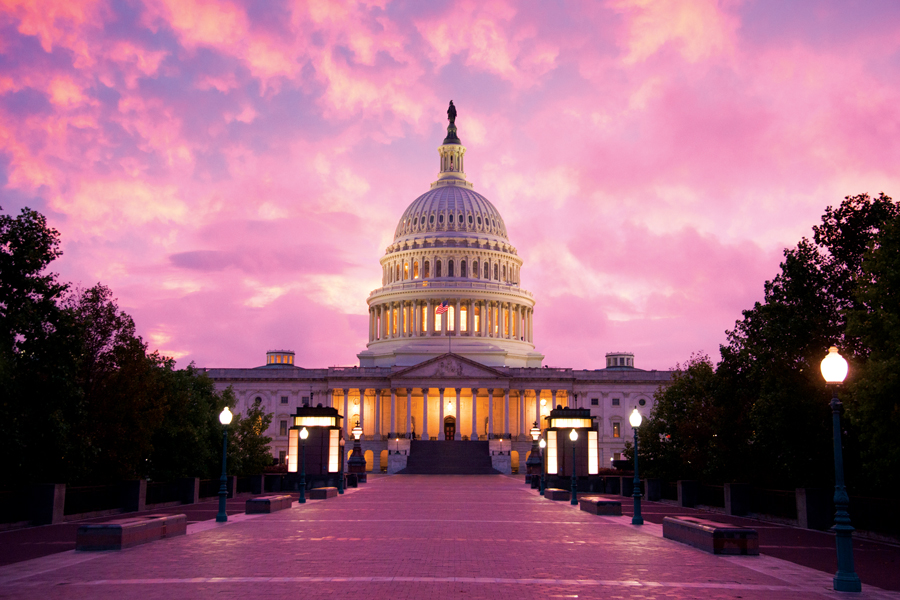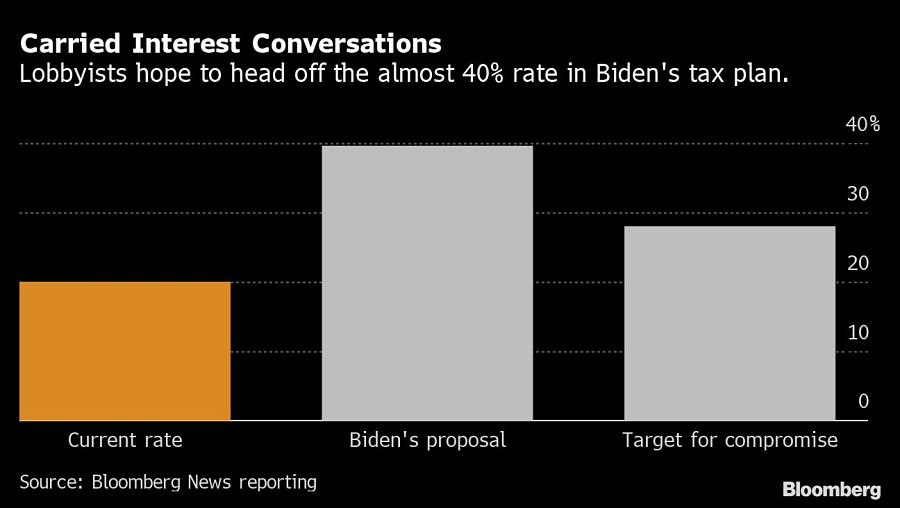

The private equity industry, not known for its public appeal among everyday Americans, is deploying politically directed ads in what could be its last stand to protect a valuable tax break that Democrats have targeted for elimination this year.
Arizona, with its two moderate Democratic senators, is on the receiving end of one of them.
“Thank you for representing a top state for private investment,” the American Investment Council, a trade group for private equity, says in a message directed to Sens. Kyrsten Sinema and Mark Kelly. Private-equity investment in Arizona totaled $11.6 billion in 2020, the ad says — more than 3% of the state’s GDP for the year.
The appeal, targeting 25 members of Congress, asks them to oppose “policies that discourage” private-equity investment — code for the so-called carried interest tax break that Democrats have decried as favoring the wealthy.
In Washington, lobbyists are meeting with lawmakers and privately discussing ways to minimize changes to carried interest, according to a person familiar with the talks. They’re hopeful Democrats will ultimately agree to a less drastic hike in the tax rate, the person said.

It’s all a sign of how seriously the industry is taking the prospects — after years of failed efforts — of an end to the provision, which allows fund managers to pay a much lower rate on a key source of their income than the income-tax rates typical workers pay on wages and salaries.
President Joe Biden’s plans would tax carried interest, which private equity managers earn from the investments they make, at rates as high as 39.6%, against 20% today. The administration has also proposed a top tax rate of 39.6%, up from 37%, for those earning $1 million or more, giving rich investors fewer avenues to limit their tax bills.
Privately, many executives are worried that the lobbying efforts will be of limited help, and have accepted the tax break will be eliminated or significantly pared back. Lobbyists are hoping Democrats will stop short of Biden’s plan for a 39.6% top capital gains rate, and end up around 28% to 30%. They will seek to have that same rate applied to carried interest, the person familiar with the matter said.
“This one here they can’t escape — there will be a change,” said Jerry Musi, who’s been advising private equity firms for a quarter century. Still, “I don’t believe it will be as severe as what the proposal is saying right now,” he said.
The Senate offices of Sinema and Kelly didn’t respond to a request for comment on the lobbying campaign.
Eliminating the preferential tax rate for private equity is one of a package of reforms Biden and congressional Democrats are planning to help pay for the biggest expansion in social spending in decades — all part of a broad initiative to address trenchant inequality.
But moderate lawmakers have opposed some of the Biden tax plans as laid out, seeking less of a hit in the face of Republican attacks that higher levies would damage economic growth.
Other targets of the private equity industry’s public campaign are Sens. Mark Warner of Virginia and Cory Booker of New Jersey, who represent areas with significant private equity investment. Arguments include making a case that the investments the firms make help support Biden’s goals.
“Private equity is an essential component of the president’s plan to Build Back Better -- the industry’s investments have supported thousands of small businesses and fueled clean energy projects across America,” Drew Maloney, who heads the American Investment Council, said in a statement. “As our nation recovers from the COVID-19 pandemic, Washington should not move forward with tax increases that discourage private investment in small businesses, workers, and innovation.”
The National Association of Investment Companies, a separate trade group, sent a letter to House Ways and Means Chairman Richard Neal this month saying that private equity funds “fuel” pension funds for city, state and federal workers, as well as support endowments and foundations.
The amount of revenue raised would be limited, with the Congressional Budget Office estimating it at $14 billion over a decade -- what amounts to a rounding error in the more than $3.6 trillion in tax increases Biden has proposed.
Back in 2017, the private equity industry successfully fought off major changes in the Republican tax overhaul that year, when some in the GOP considered cutting the tax break as a way to pay for reductions elsewhere. In the end, the GOP kept the carried interest tax break intact but required that investors hold their investments for longer to get the benefit.
Now, there’s wide support among Democrats to remove the tax break altogether.
“You’ve got outrageous situations with carried interest, and with other parts of the tax code that have allowed the wealthy to get wealthier,” Sen. Amy Klobuchar, a moderate Minnesota Democrat, said in an interview with Bloomberg TV’s Emily Chang. “We lose money that we should be bringing in to pay for really important services -- and then to make matters worse they have so much lobbying power and people basically fall prey to their lobbying efforts.”
Private equity advisers are beginning to think about how to adapt if the proposed tax hike is enacted. One option could be to create co-investment vehicles that would pool money put in by a firm’s fund managers along with that from outside parties to invest in companies alongside a fund that would hold client money. Proceeds from the deal could then be treated as a capital gain, the thinking goes. A more immediate idea is to accelerate carried-interest payouts before any changes go into effect.
Kevin Brady, an assistant vice president at wealth manager Wealthspire Advisors who advises private equity executives on estate planning, is talking with clients about how to minimize tax bills using charitable donations in years with big payouts. Still, he advises clients to be cautious about making any big moves before legislation is finalized.
Fund managers may also start charging more fees to minimize the impact of higher taxes, said Alexander Anderson, a partner at O’Melveny & Myers. “They may try to close the gap between the current after-tax return and what happens after a change in law.”
The biggest hope: The whole tax-and-spend legislative effort falls apart over intra-party squabbles and issues unrelated to carried interest.
“There’s skepticism, No. 1, that they really have the support to get the larger tax reform package done,” Anderson said. “Most of my clients are sitting tight right now.”

Executives from LPL Financial, Cresset Partners hired for key roles.

Geopolitical tension has been managed well by the markets.

December cut is still a possiblity.

Canada, China among nations to react to president-elect's comments.

For several years, Leech allegedly favored some clients in trade allocations, at the cost of others, amounting to $600 million, according to the Department of Justice.
Streamline your outreach with Aidentified's AI-driven solutions
This season’s market volatility: Positioning for rate relief, income growth and the AI rebound
